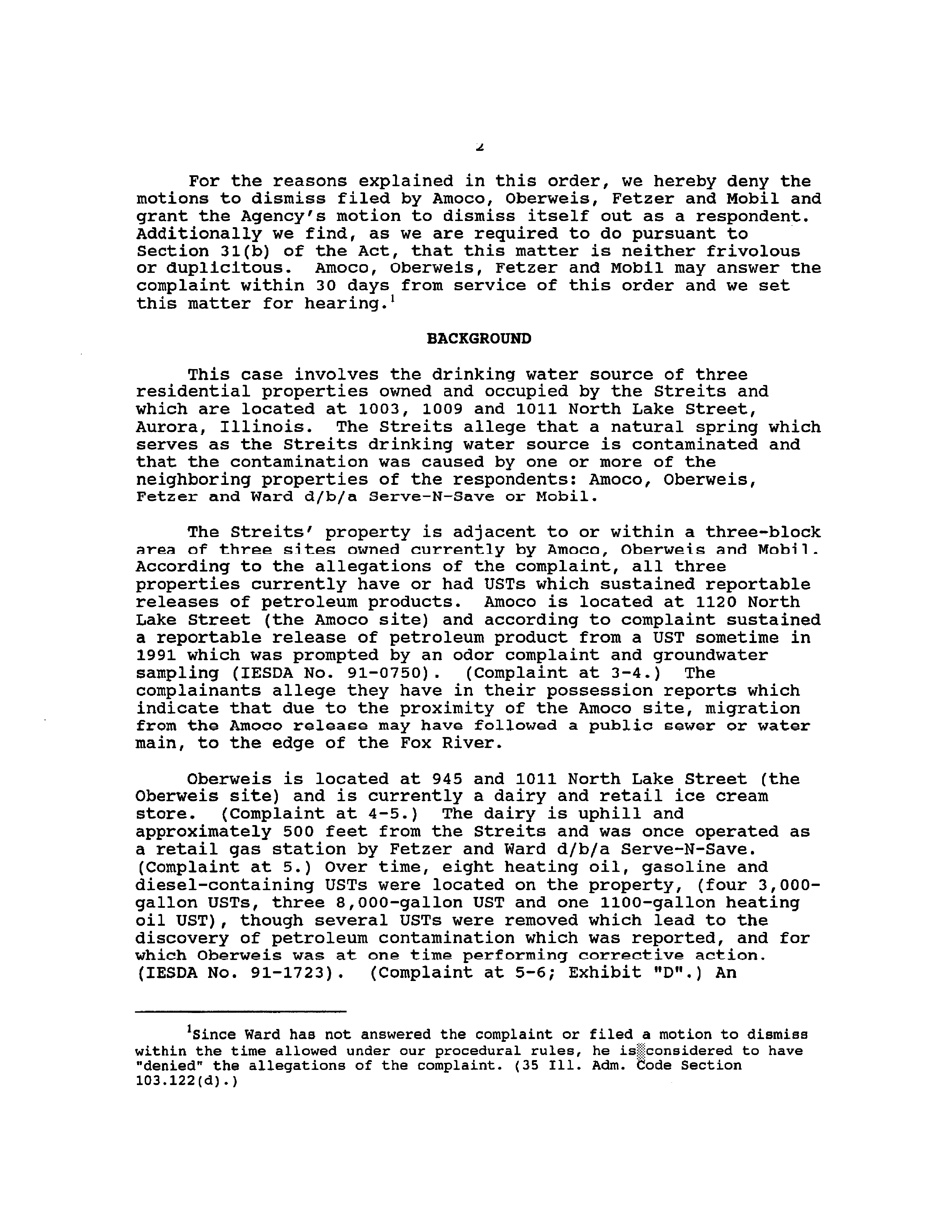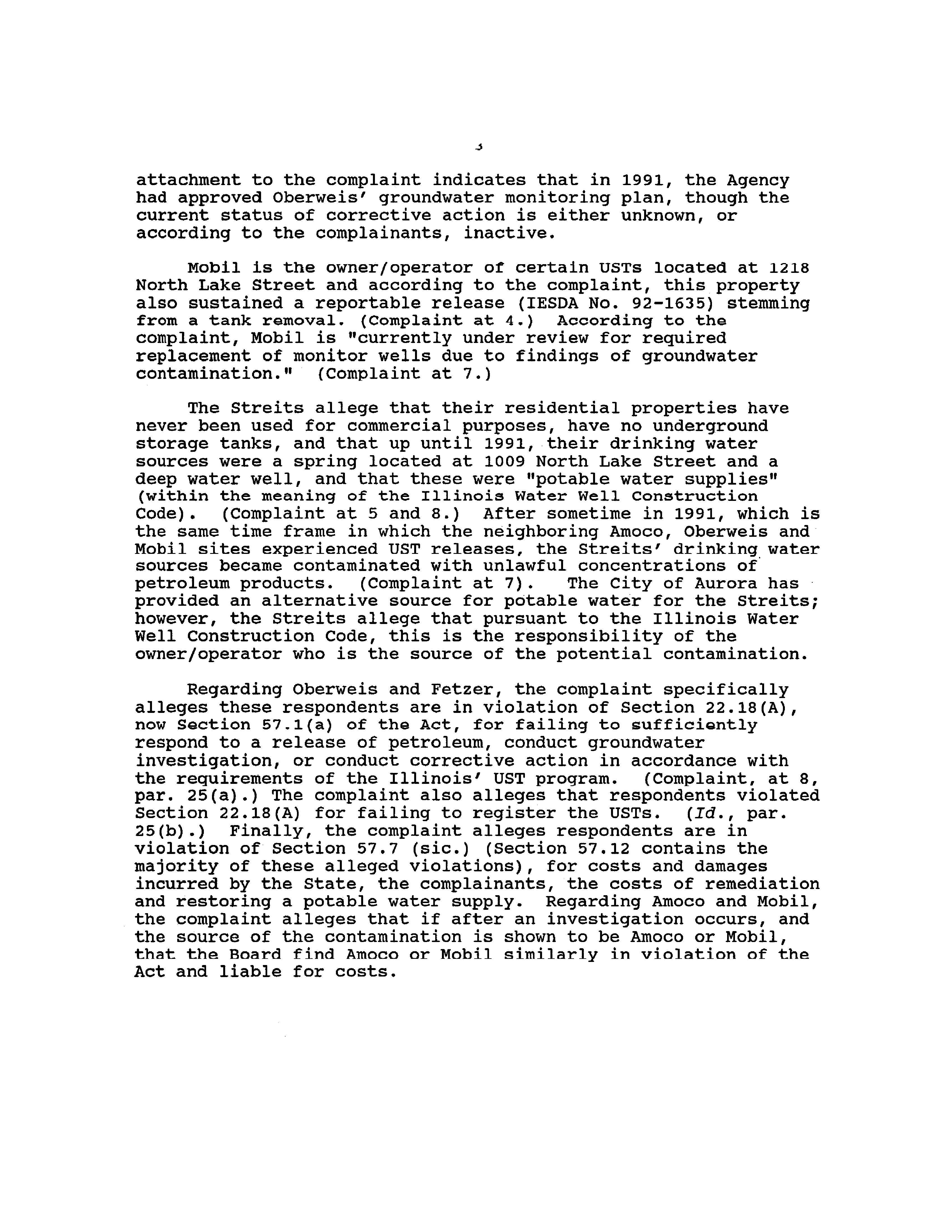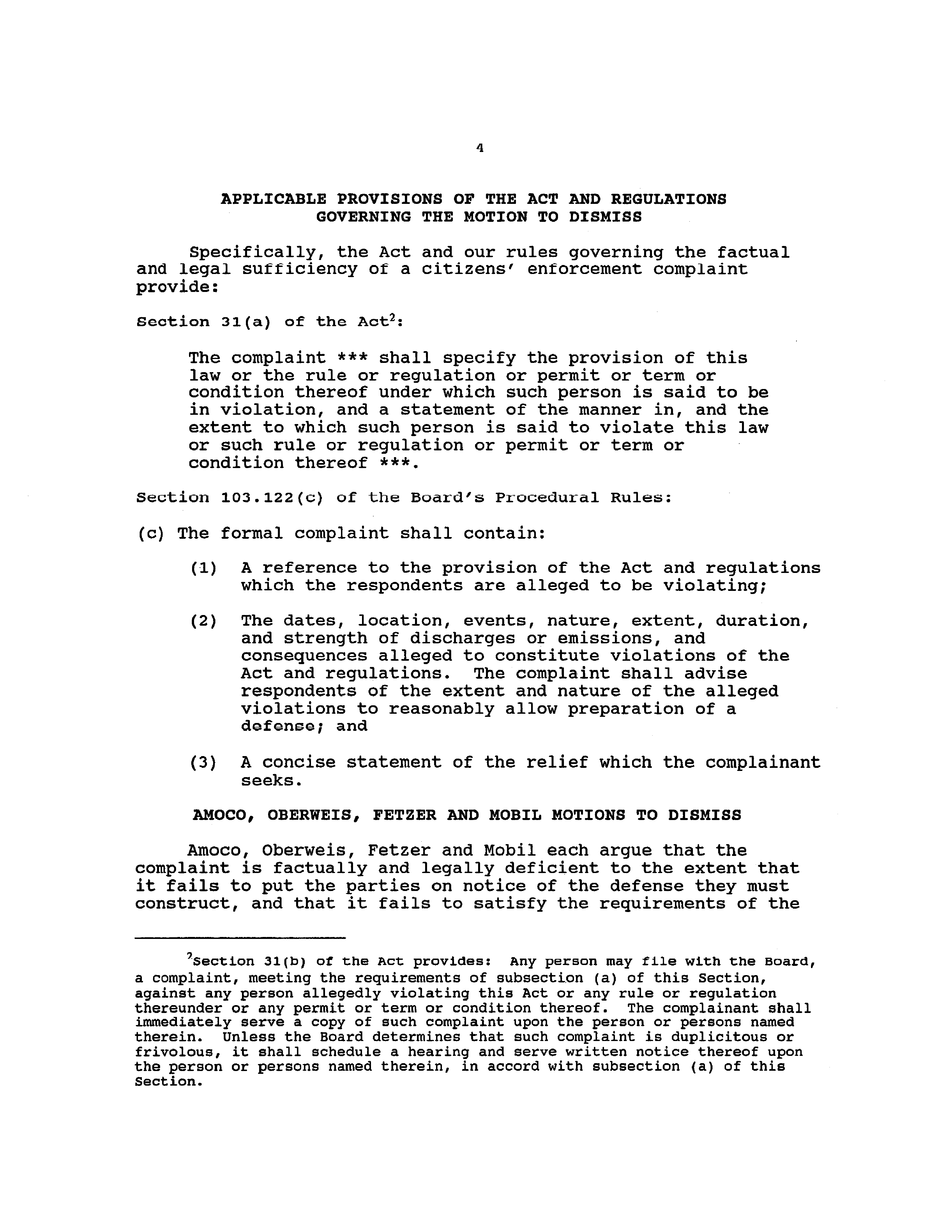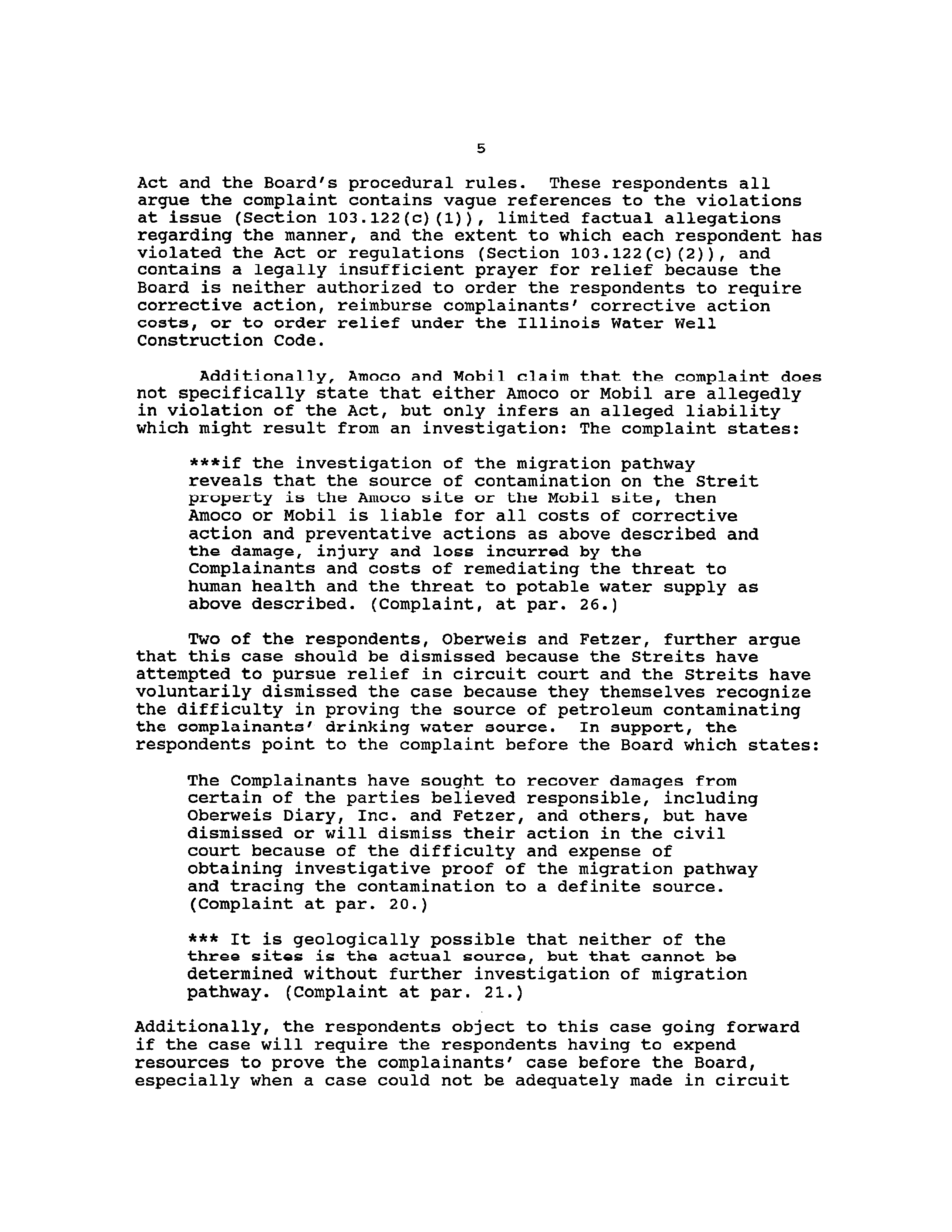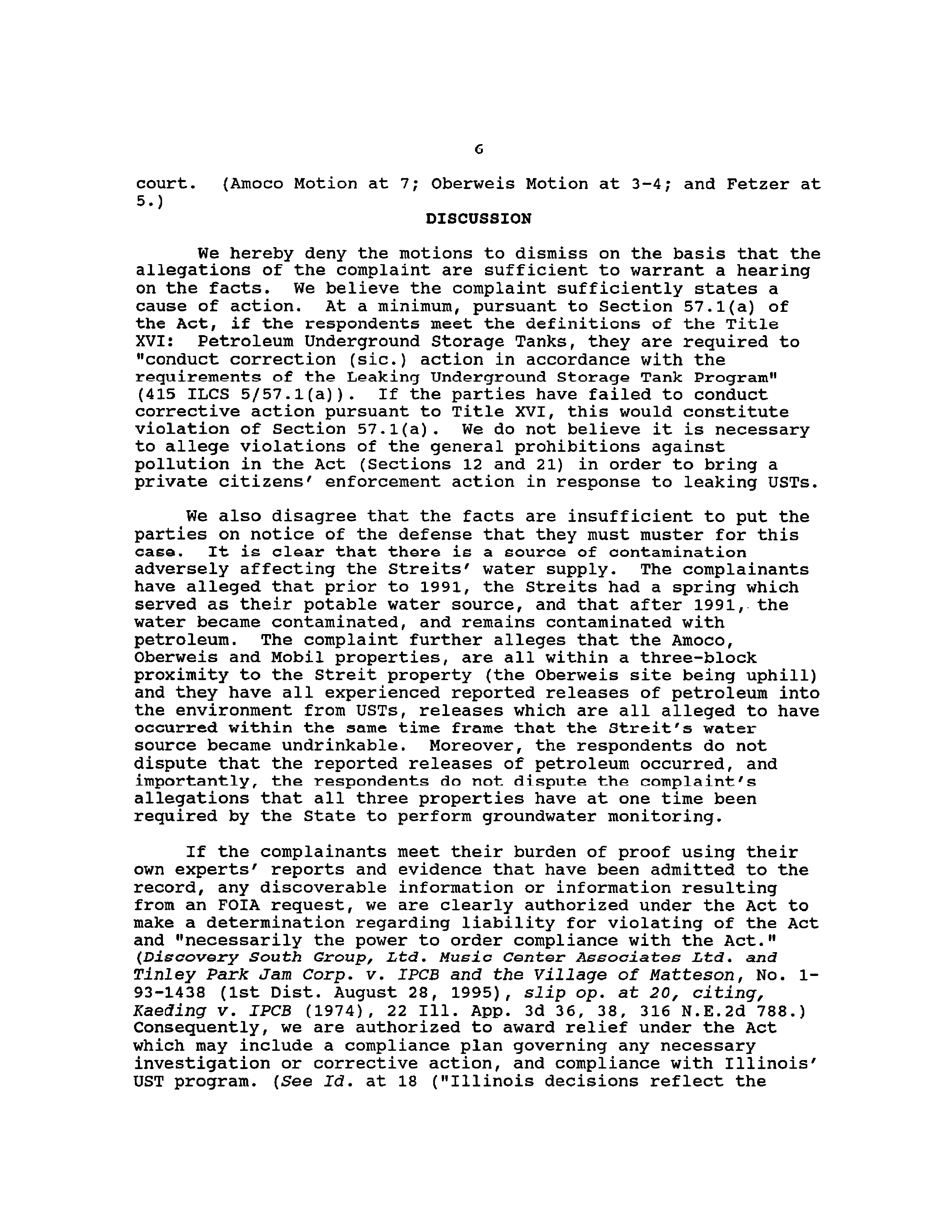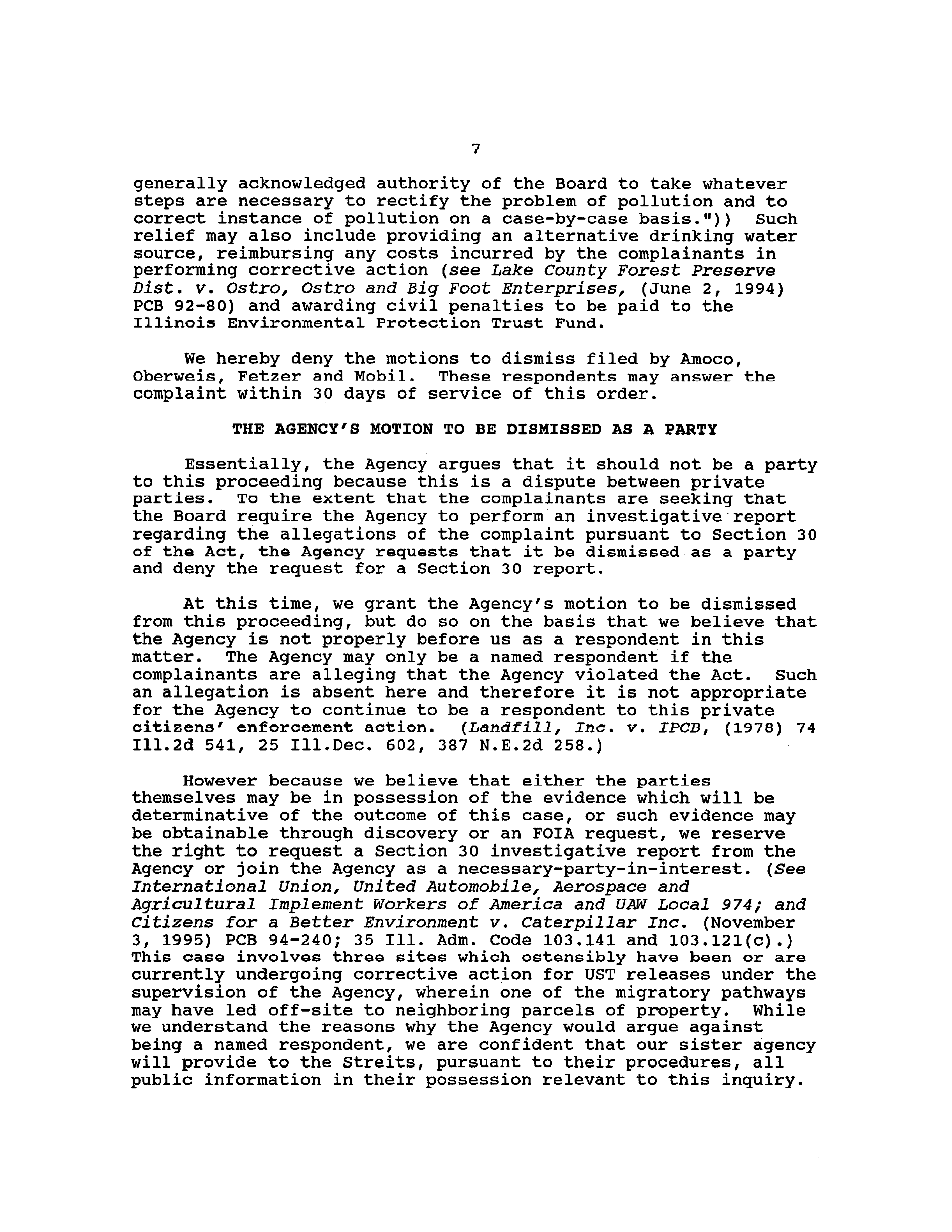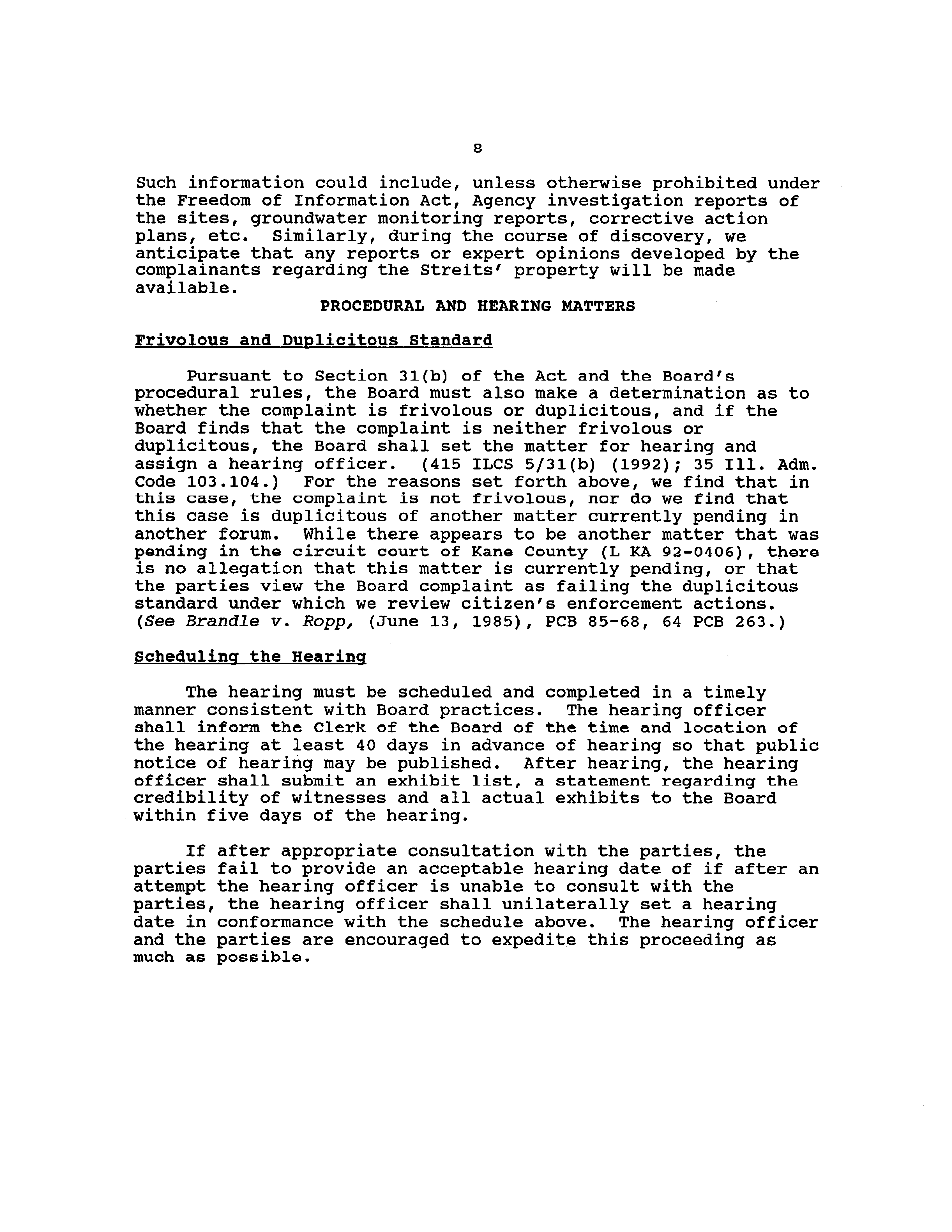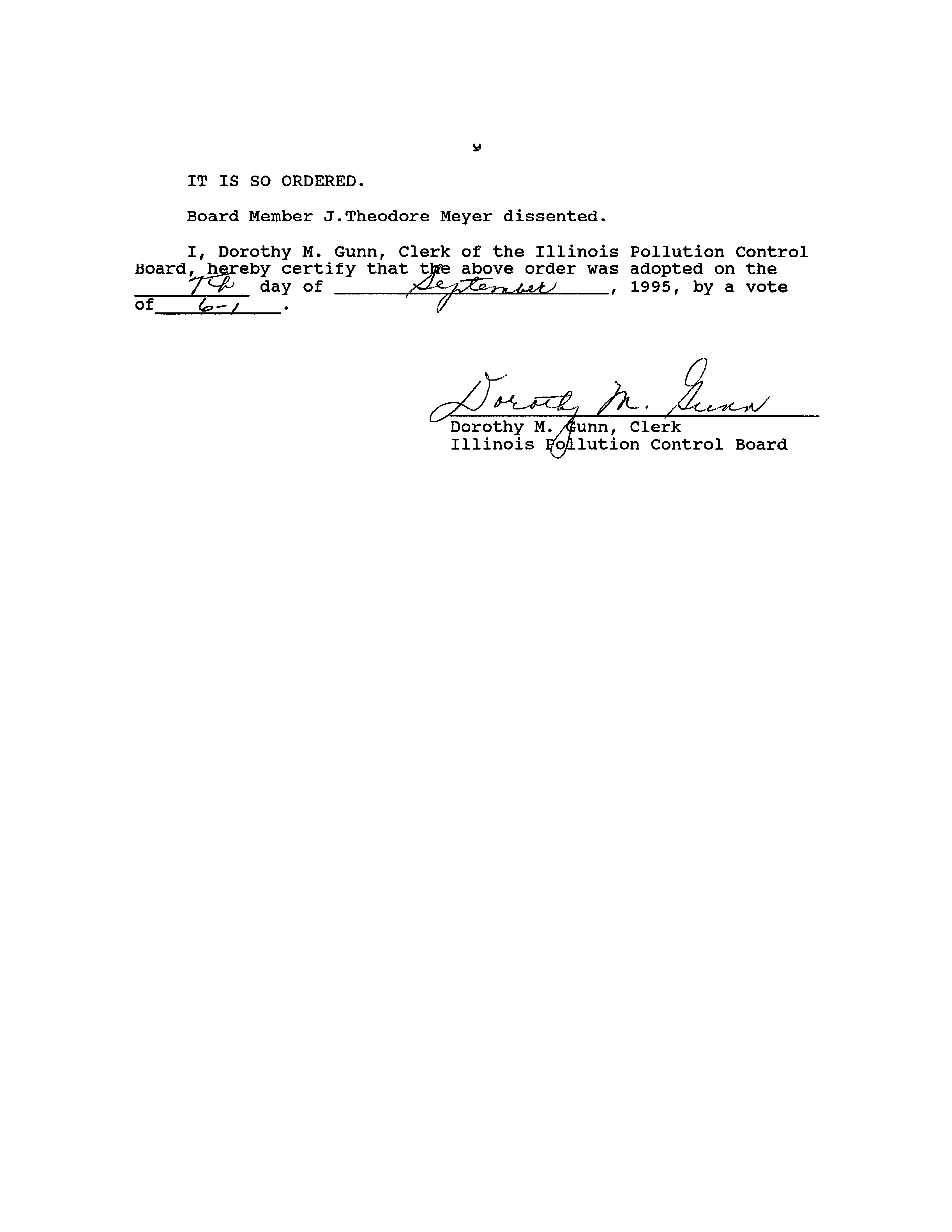.LLLLNULS
.&uL~Lu’riuL’J
CUIWflQL.
WJAk(U
September 7,
1995
OLIVE STREIT and LISA STREIT,
)
Complainants,
V.
)
PCB 95—122
)
(Enforcement
-
UST)
OBERWEIS DAIRY,
INC., RICHARD
)
3. FETZER and JOHNNIE W.
WARD
)
d/b/a SERVE-N-SAVE, and RICHARD
)
J.
FETZER, individually, AMOCO
)
OIL COMPANY, MOBIL OIL
)
CORPORATION and ILLINOIS
)
ENVIRONMENTAL PROTECTION AGENCY,
)
Respondents.
ORDER OF THE BOARD (by CA. Manning):
This matter
is before the Board on several motions to
dismiss filed by five of the respondents in this cause.
The
underlying citizens’ enforcement complaint was filed by Olive and
Lisa Streit
(Streits)
on April
4,
1995 and alleges that the
respondents, with the exception of the Illinois Environmental
Protection Agency (Agency), violated the underground storage tank
(UST) provisions
of the Illinois Environmental Protection Act
(Act)
(415 ILCS 5/57).
The complaint seeks injunctive relief,
costs and civil penalties.
Motions to dismiss were timely filed
by Amoco Oil Company
(Amoco)
on April
21,
1995; Oberweis Dairy,
Inc.
(Oberweis)
on May 5,
1995; the Agency on April 24,
1995;
Richard J. Fetzer (Fetzer) on May 11,
1995; and pursuant to an
extension granted by the
Board, Mobil
Oil Corporation
(Mobil)
on
Nay 12,
1995.
On July 26,
1995, Mobil filed a motion for leave
to amend it motion to dismiss, which the Board hereby grants.
Additionally, our review of Fetzer’s motion to dismiss shows that
Fetzer appears to be moving for dismissal in his capacity of
being held personally, and individually liable, rather than in
his capacity as doing business as Serve-N—Save.
Therefore,
the
only party to have not filed a motion to dismiss,
or otherwise
answer is Johnnie W. Ward.
Further, no response has been filed
by the Streits to any of the motions pending before the Board.
Though each motion to dismiss raises independent and various
grounds for dismissal relative to each respondent, the motions,
other than that of
the Agency,
all argue the complaint is
factually and legally deficient pursuant to the Act
(415 ILCS
31(a)) and the Board’s procedural rules
(35 Ill. Adm. Code
Section 103.122(c)),
is therefore frivolous and should be
dismissed.
The Agency’s motion seeks to have the Agency
dismissed as a party-respondent on the basis that the complaint
is in actuality,
asking the Agency to perform an investigation of
the property at issue.
.2
For the reasons explained in this order, we hereby deny the
motions to dismiss filed by Amoco, Oberweis, Fetzer and Nobil and
grant the Agency’s motion to dismiss itself out as
a respondent.
Additionally we find,
as we are required to do pursuant to
Section 31(b)
of the Act, that this matter is neither frivolous
or duplicitous.
Amoco, Oberweis, Fetzer and Mobil may answer the
complaint within 30 days from service of this order and we set
this matter for hearing.’
BACKGROUND
This case involves the drinking water source of three
residential properties owned and occupied by the Streits and
which are located at 1003,
1009 and 1011 North Lake Street,
Aurora, Illinois.
The Streits allege that
a natural spring which
serves as the Streits drinking water source is contaminated and
that the contamination was caused by one or more of the
neighboring properties of the respondents: Amoco, Oberweis,
Fetzer and Ward dfb/a Serve-N-Save or Mobil.
The Streits’ property is adjacent to or within a three-block
~
of
three
~ite~ owned crnrreritly by Amoco, Oberweig ~nd Mobil.
According to the allegations of the complaint,
all three
properties currently have or had USTs which sustained reportable
releases of petroleum products.
Amoco
is located at 1120 North
Lake Street
(the Amoco site)
and according to complaint sustained
a reportable release of petroleum product from a UST sometime in
1991 which was prompted by an odor complaint and groundwater
sampling (IESDA No.
91-0750).
(Complaint at 3-4.)
The
complainants allege they have in their possession reports which
indicate that due to the proximity of the Amoco site, migration
from the Amoco releace may have followed a public cower or water
main, to the edge of the Fox River.
Oberweis is located at 945 and 1011 North Lake Street
(the
Oberweis site)
and is currently a dairy and retail ice cream
store.
(Complaint at 4-5.)
The dairy is uphill and
approximately 500 feet from the Streits and was once operated as
a retail gas station by Fetzer and Ward d/b/a Serve-N-Save.
(Complaint at
5.) Over time,
eight heating oil, gasoline and
diesel-containing USTs were located on the property,
(four 3,000-
gallon UST5,
three 8,000-gallon UST and one 1100—gallon heating
oil UST), though several USTs were removed which lead to the
discovery of petroleum contamination which was reported, and for
which Oberweis was at one time performing corrective action.
(IESDA No. 91—1723).
(Complaint at 5—6; Exhibit
“D”.)
An
1Since Ward has not answered the complaint or filed a motion to dismiss
within the time allowed under our procedural rules, he is~consideredto have
“denied” the allegations of the complaint.
(35
Ill. Adm. Code Section
103.122(d).)
—S
attachment to the complaint indicates that in 1991, the Agency
had approved Oberweis’ groundwater monitoring plan, though the
current status of corrective action is either unknown, or
according to the complainants, inactive.
Mobil is the owner/operator or certain USTs located at 1218
North Lake Street and according to the complaint,
this property
also sustained a reportable release
(IESDA No. 92-1635)
stemming
from a tank removal.
(Complaint at 4.)
According to the
complaint, Mobil is “currently under review for required
replacement of monitor wells due to findings of groundwater
contamination.”
(Complaint at
7.)
The Streits allege that their residential properties have
never been used for commercial purposes, have no underground
storage tanks, and that up until 1991,
their drinking water
sources were a spring located at 1009 North Lake Street and a
deep water well,
and that these were “potable water supplies”
(within the meaning of the Illinois Water Well Construction
Code).
(Complaint at 5 and 8.)
After sometime in 1991,
which is
the same time frame in which the neighboring Amoco, Oberweis and
Mobil sites experienced liSP releases, the Streits’ drinking water
sources became contaminated with unlawful concentrations of
petroleum products.
(Complaint at 7).
The City of Aurora has
provided an alternative source for pOtable water for the Streits;
however, the Streits allege that pursuant to the Illinois Water
Well Construction Code,
this is the responsibility of the
owner/operator who is the source of the potential contamination.
Regarding Oberweis and Fetzer, the complaint specifically
alleges these respondents are in violation of Section 22.18(A),
now Section 57.1(a)
of the Act, for failing to sufficiently
respond to a release of petroleum,
conduct groundwater
investigation,
or conduct corrective action in accordance with
the requirements of the Illinois’ UST program.
(Complaint, at
8,
par.
25(a).)
The complaint also alleges that respondents violated
Section 22.18(A)
for failing to register the USTs.
(Id.,
par.
25(b).)
Finally, the complaint alleges respondents are in
violation of Section 57.7
(sic.)
(Section 57.12 contains the
majority of these alleged violations), for costs and damages
incurred by the State, the complainants, the costs of remediation
and restoring a potable water supply.
Regarding
Amoco
and Mobil,
the complaint alleges that if after an investigation occurs, and
the source of the contamination is shown to be Amoco or Mobil,
that the Board find Amoco or Mobil similarly in violation of the
Act and liable for costs.
4
APPLICABLE PROVISIONS OP THE ACT MID REGULATIONS
GOVERNING THE MOTION TO DISMISS
Specifically, the Act and our rules governing the factual
and legal surficiency of a citizens’ enforcement complaint
provide:
Section 31(a)
of the Act2:
The complaint ~
shall specify the provision of this
law or the rule or regulation or permit or term or
condition thereof under which such person is said to be
in violation,
and a statement of the manner in, and the
extent to which such person is said to violate this law
or such rule or regulation or permit or term or
condition thereof
***.
Section 103.122(c)
of the Board’s Procedural Rules:
(c) The formal complaint shall contain:
(1)
A reference to the provision of the Act and regulations
which the respondents are alleged to be violating;
(2)
The dates,
location,
events,
nature,
extent, duration,
and strength of discharges
or emissions,
and
consequences alleged to constitute violations of the
Act and regulations.
The complaint shall advise
respondents of the extent and nature of the alleged
violations to reasonably allow preparation of a
dofonee; and
(3)
A concise statement of the relief which the complainant
seeks.
AMOCO, OBERWEIS,
FETZER AND MOBIL MOTIONS TO DISMISS
Amoco, Oberweis, Fetzer and Mobil each argue that the
complaint is factually and legally deficient to the extent that
it fails to put the parties on notice of the defense they must
construct, and that it fails to satisfy the requirements of the
‘Section 31(b)
of the Act provides:
Any person may file with the Board,
a complaint, meeting the requirements of subsecti.on
(a)
of this Section,
against any person allegedly violating this Act or any rule or regulation
thereunder or any permit or term or condition thereof.
The complainant shall
immediately serve a copy of such complaint upon the person or persons named
therein.
Unless the Board determines that such complaint is duplicitous or
frivolous,
it shall schedule a hearing and serve written notice thereof upon
the person or persons named therein,
in accord with subsection
(a)
of this
Section.
5
Act and the Board’s procedural rules.
These respondents all
argue the complaint contains vague references to the violations
at issue (Section 103.122(c) (1)),
limited factual allegations
regarding the manner,
and the extent to which each respondent has
violated the Act or regulations
(Section 103.122(c) (2)), and
contains a legally insufficient prayer for relief because the
Board is neither authorized to order the respondents to require
corrective action, reimburse complainants’ corrective action
costs, or to order relief under the Illinois Water Well
Construction Code.
Additionally,
Amoco and Mobil claim that the complaint does
not specifically state that either Amoco or Mobil are allegedly
in violation of the Act, but only infers an alleged liability
which might result from an investigation: The complaint states:
***if the investigation of the migration pathway
reveals that the source of contamination on the Streit
property is the Amoco site or the Mobil site,
then
Amoco or Mobil is liable for all costs of corrective
action and preventative actions as above described and
the damage,
injury and loss incurred by the
Complainants and costs of remediating the threat to
human health and the threat to potable water supply as
above described.
(Complaint,
at par.
26.)
Two
of the respondents, Oberweis and Fetzer, further argue
that this case should be dismissed because the Streits have
attempted to pursue relief in circuit court and the Streits have
voluntarily dismissed the case because they themselves recognize
the difficulty
in proving the source of petroleum contaminating
the complainants’ drinking water source.
In support, the
respondents point to the complaint before the Board which states:
The Complainants have sought to recover damages from
certain of the parties believed responsible, including
Oberweis Diary,
Inc. and Fetzer, and others, but have
dismissed or will dismiss their action in the civil
court because of the difficulty and expense of
obtaining investigative proof of the migration pathway
and tracing the contamination to a definite source.
(Complaint at par.
20.)
***
It is geologically possible that neither of the
three sites
is the actual source,
but that cannot be
determined without further investigation of migration
pathway.
(Complaint at par.
21.)
Additionally, the respondents object to this case going forward
if the case will require the respondents having to expend
resources to prove the complainants’ case before the Board,
especially when a case could not be adequately made in circuit
6
court.
(Amoco Motion at
7; Oberweis Motion at 3—4; and Fetzer at
5.)
DISCUSSION
We hereby deny the motions to dismiss on the basis that the
allegations of the complaint are sufficient to warrant a hearing
on the facts.
We believe the complaint sufficiently
states a
cause of action.
At a minimum, pursuant to Section 57.1(a)
of
the Act,
if the respondents
meet the definitions of the Title
XVI:
Petroleum Underground Storage Tanks, they are required to
“conduct correction
(sic.) action in accordance with the
requirements of the Leaking Underground Storage Tank
Program”
(415 ILCS 5/57.1(a)).
If the parties have failed to conduct
corrective action pursuant to Title XVI,
this would constitute
violation of section 57.1(a).
We do not believe it is necessary
to allege violations of the general prohibitions against
pollution in the Act (Sections 12 and 21)
in order to bring a
private citizens’ enforcement action in response to leaking UST5.
We also disagree that the facts are insufficient to put the
parties on notice of the defense that they must muster for this
case.
It is clear that there is a source of contamination
adversely affecting the Streits’ water supply.
The complainants
have alleged that prior to 1991,
the Streits had
a spring which
served as their potable water source, and that after 1991,. the
water became contaminated, and remains contaminated with
petroleum.
The complaint further alleges that the Amoco,
Oberweis and Mobil properties, are all within a three-block
proximity to the Streit property
(the Oberweis site being uphill)
and they have all experienced reported releases
of petroleum into
the environment from USTs, releases which are all alleged to have
occurred within the same time frame that the Streit’s water
source became undrinkable.
Moreover,
the respondents do not
dispute that the reported releases of petroleum occurred,
and
importantly,
the respondents do not dispute the complaint’s
allegations that all three properties have at one time been
required by the State to perform groundwater monitoring.
If the
complainants meet their burden of proof using their
own experts’ reports and evidence that have been admitted to the
record, any discoverable information or information resulting
from an FOIA request,
we are clearly authorized
under the Act to
make a determination regarding liability for violating of the Act
and “necessarily
the power to order compliance with the Act.”
(Discovery South Group,
Ltd. Music Center Associates Ltd. and
Tinley Park Jam Corp.
V.
IPCB and the Village of Matteson,
No.
1-
93—1438
(1st Dist. August 28, 1995),
slip op.
at 20,
citing,
Kaeding V. IPCB
(1974),
22 Ill. App.
3d 36,
38,
316 N.E.2d 788.)
Consequently, we are authorized to award relief under the Act
which may include a compliance plan governing any necessary
investigation or corrective action, and compliance with Illinois’
UST program.
(See Id.
at
18
(“Illinois decisions reflect the
7
generally acknowledged authority of the Board to take whatever
steps are necessary to rectify the problem of pollution and to
correct instance of pollution on a case—by-case basis.”))
Such
relief may also include providing an alternative drinking water
source, reimbursing any costs incurred by the complainants in
performing corrective action
(see Lake County Forest Preserve
Dist.
V.
Ostro, Ostro and Big Foot Enterprises,
(June
2,
1994)
PCB 92-80) and awarding civil penalties to be paid to the
Illinois Environmental Protection Trust Fund.
We hereby deny the motions to dismiss filed by Amoco,
Oberweis, Fetzer ~nd Mobil.
These respondents may answer the
complaint within 30 days of service of this order.
THE AGENCY’S MOTION TO BE DISMISSED AS A PARTY
Essentially, the Agency argues that it should not be a party
to this proceeding because this is a dispute between private
parties.
To the extent that the complainants are seeking that
the Board require the Agency to perform an investigative report
regarding the allegations of the complaint pursuant to Section 30
of the Act, the Agency requests that it be dismissed as a party
and deny the request for a Section 30 report.
At this time, we grant the Agency’s motion to be dismissed
from this proceeding, but do so on the basis that we believe that
the Agency is not properly before us as a respondent in this
matter.
The Agency may only be a named respondent if the
complainants are alleging that the Agency violated the Act.
Such
an allegation is absent here and therefore it
is not appropriate
for the Agency to continue to be a respondent to this private
citizens’ enforcement action.
(Landfill,
Inc.
v.
IPCD,
(1978)
74
Ill.2d 541,
25 Ill.Dec.
602,
387 N.E.2d 258.)
However because we believe that either the parties
themselves may be in possession of the evidence which will be
determinative of the outcome of this case,
or such evidence may
be obtainable through discovery or an FOIA request, we reserve
the right to request a Section 30 investigative report from the
Agency or join the Agency as a necessary—party—in—interest.
(See
International Union, United Automobile, Aerospace and
Agricultural Implement Workers of America and (JAW Local 974; and
Citizens for a Better Environment v.
Caterpillar Inc.
(November
3,
1995) PCB94—240;
35 Ill. Adm.
Code 103.141 and 103.121(c).)
This case involves three sites which ostensibly have been or are
currently undergoing corrective action for UST releases under the
supervision of the Agency, wherein one of the migratory pathways
may have led off—site to neighboring parcels of property.
While
we understand the reasons why the Agency would argue against
being a named respondent, we are confident that our sister agency
will provide to the Streits, pursuant to their procedures, all
public information in their possession relevant to this inquiry.
8
Such information could include, unless otherwise prohibited under
the Freedom of Information Act, Agency investigation reports of
the sites, groundwater monitoring reports, corrective action
plans, etc.
Similarly, during the course of discovery, we
anticipate that any reports or expert opinions developed by the
complainants regarding the Streits’ property will be made
available.
PROCEDURAL AND HEARING MATTERS
Frivolous and Duplicitous Standard
Pursuant to Section 31(h)
of the Act and the Roard’s
procedural rules, the Board must also make a determination as to
whether the complaint is frivolous or duplicitous, and if the
Board finds that the complaint is neither frivolous or
duplicitous, the Board shall set the matter for hearing and
assign a hearing officer.
(415 ILCS 5/31(b)
(1992);
35 Ill.
Adm.
Code 103.104.)
For the reasons set forth above, we find that in
this case, the complaint is not frivolous, nor do we find that
this case is duplicitous of another matter currently pending in
another forum.
While there appears to be another matter that was
pending in the circuit court of Kane County
(L KA 92-0406), there
is no allegation that this matter is currently pending, or that
the parties view the Board complaint as failing the duplicitous
standard under which we review citizen’s enforcement actions.
(See
Brandle v. Ropp,
(June 13,
1985), PCB 85-68,
64 PCB 263.)
Scheduling the Hearing
The hearing must be scheduled and completed in a timely
manner consistent with Board practices.
The hearing officer
shall inform the Clerk of the Board of the time and location of
the hearing at least 40 days in advance of hearing so that public
notice of hearing may be published.
After hearing, the hearing
officer shall submit an exhibit list,
a statement regarding the
credibility of witnesses and all actual exhibits to the Board
within five days of the hearing.
If after appropriate consultation with the parties, the
parties fail to provide an acceptable hearing date of if after an
attempt the hearing officer is unable to consult with the
parties, the hearing officer shall unilaterally set a hearing
date in conformance with the schedule above.
The hearing officer
and the parties are encouraged to expedite this proceeding as
much as possible.
9
IT IS SO ORDERED.
Board Member J.Theodore Meyer dissented.
I, Dorothy M.
Gunn,
Clerk of the Illinois Pollution Control
Board,jie.reby certiry that t
above order was adopted on the
/~
day of _______________________,
1995,
by a vote
of___________
~‘
Dorothy M.,4’unn, Clerk
Illinois ~‘~4lutionControl Board


